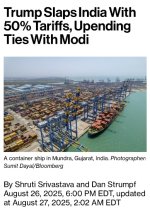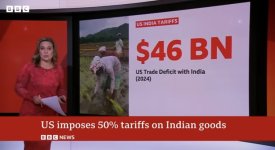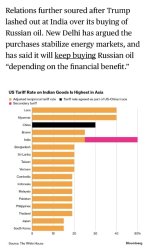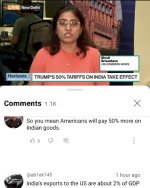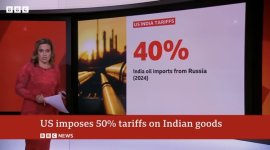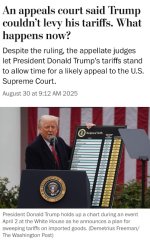Well, this is interesting. The judges on the US Court of Appeals get to keep their jobs at this point, or at least four of them anyway. A federal appeals court
ruled 7-4 on Friday that President Donald Trump’s tariffs were illegal, and that he did not have the authority to impose most of his broad tariffs on foreign products from across the globe.
The U.S. Court of Appeals for the Federal Circuit upheld a lower-court decision that Trump overstepped his authority when imposing most of his tariffs.
Despite the ruling, Trump’s tariffs will be allowed to remain in effect for now, to allow time for an appeal.

. Time to appeal the appeal?
View attachment 30841
U.S. Attorney General Pam Bondi
said the court’s decision was wrong and that the Justice Department would appeal the ruling to the Supreme Court.
If Trump’s tariffs are annulled, the Trump administration has other ways to impose them, such as through the
1974 Trade Act. That particular law, however, restricts tariffs to 15 percent and 150 days, “unless such period is extended by Act of Congress.”
A lower court will also reconsider part of the case on whether the government should refund tariffs to all companies that already paid them, or just the parties that sued the government.

The ruling involves tariffs imposed through five executive orders from February to April. In some of those orders, the Trump administration justified tariffs on
Canada,
Mexico and
China by alleging that those countries had taken insufficient action to stem the flow of illicit drugs into the United States.
In another order, Trump
said that “large and persistent annual U.S. goods trade deficits” with the rest of the world warranted sweeping tariffs affecting
more than 50 countries, including Cambodia, Laos and Lesotho.
(The ruling does not cover all tariffs imposed by the Trump administration, such as
those on steel and aluminum)
Despite the ruling, the appellate judges let President Donald Trump’s tariffs stand to allow time for a likely appeal to the U.S. Supreme Court.

apple.news
The court ruled that Trump overstepped his authority in using the 1977 International Emergency Economic Powers Act (IEEPA) to impose most of his tariffs. The IEEPA is an emergency law that has been used to impose economic sanctions in the case of threats against the country.
In the Friday ruling, a majority of federal judges said that the law “bestows significant authority on the President to undertake a number of actions in response to a declared national emergency, but none of these actions explicitly include the power to impose tariffs, duties, or the like, or the power to tax.”
It noted that, “when drafting IEEPA, Congress did not use the term ‘tariff’ or any of its synonyms, like ‘duty’ or ‘tax,’” and that “other statutes indicate that whenever Congress intends to delegate to the President the authority to impose tariffs, it does so explicitly, either by using unequivocal terms like tariff and duty, or via an overall structure which makes clear that Congress is referring to tariffs.”
In a post on social media, Trump
called the court a “Highly Partisan Appeals Court” and said “ALL TARIFFS ARE STILL IN EFFECT!”
The 11 judges who heard the case were named by presidents from both parties. The dissenting opinion was written by a judge nominated by President Barack Obama.
The Liberty Justice Center, which represents the small businesses in the lawsuit,
described Friday’s ruling as its “second major victory” in its challenge against Trump’s tariffs, adding that IEEPA “
does not give the President unilateral authority to impose tariffs on any country he wants, at any time he wants, at any rate he wants, for any reason he wants.”

(Since the tariffs were proposed, the Trump administration has signed deals with the
United Kingdom, the 27-nation
European Union, Japan and South Korea)
The administration is still in negotiations with
Mexico and
China, while steep levies were introduced on imports from
India,
Switzerland and
Canada, among other countries, earlier in August.
